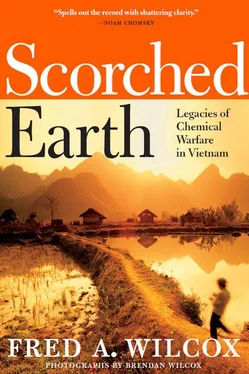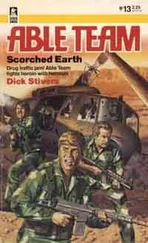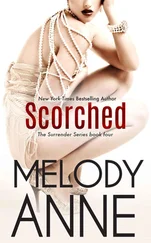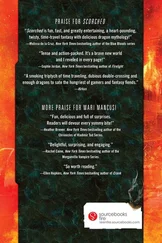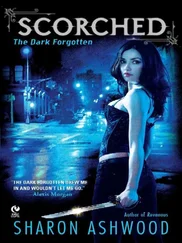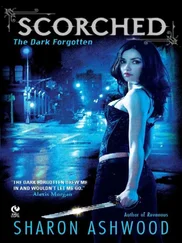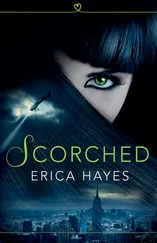(e) A generalized morally or ethnically-based objection to this particular war or the way it was pursued by the USA. 22
On January 22, 1975, President Gerald Ford announces that he has signed “instruments of ratification of the Geneva Protocol of 1925, and the biological Weapons Convention, to which the Senate gave its advice and consent on December 16, 1974.” Mr. Ford decides:
that the United States shall renounce as a matter of national policy:
(1) first use of herbicides in war except use, under regulations applicable to their domestic use, for control of vegetation within J.S. bases and installations or around their immediate defense perimeters,
(2) first use of riot control agents in war except in defensive military modes to save lives, such as use of riot control agents in riot situations, to reduce civilian casualties, for rescue missions, and to protect rear area convoys.
This policy is detailed in the Executive order which I will issue today. The order also reaffirms our policy established in 1971 that any use in war of chemical herbicides and riot control agents must be approved by me in advance…
It is in my earnest hope that all nations will find it in their interest to join in this prohibition against biological weapons. 23
In April 1969, the military releases a “Department of the Army Training Circular” stating: “ORANGE is relatively nontoxic to man and animals. No injuries have been reported to personnel exposed to aircraft spray. Personnel subject to splashes from handling the agent need not be alarmed, but should shower and change clothes at a convenient opportunity. ORANGE is noncorrosive to metals but will remove aircraft paint and walkway coatings. Contaminated aircraft should be washed with soapy water to remove the agent.” 24
In December 1969, the Council of the American Association for the Advancement of Science passes a resolution stating that:
Whereas, recent studies commissioned by the National Cancer Institute have shown that 2,4,5-T and 2,4-D cause birth malformations in experimental animals, and whereas, the above studies conclude that 2,4,5-T is probably dangerous to man, and that 2,4-D is potentially dangerous to man…
Whereas, there is a possibility that the use of herbicides in Vietnam is causing birth malformations among infants of exposed mothers;
Therefore, be it resolved that the Council of AAAS urge that the US Department of Defense immediately cease all use of 2,4-D and 2,4,5-T in Vietnam. 25
The defoliation campaign officially ends in 1970. However, the last American unit does not leave Vietnam until 1973, and it’s hard to imagine that commanders will allow dense foliage to grow around their base camps, giving attackers cover to reach the perimeter without being detected. Perhaps American pilots do stop soaking the countryside with Agent Orange, but that does not mean that South Vietnam’s Air Force stops flying spray missions, or that soldiers from South Korea, Australia, New Zealand, and the US stop spraying Agent Orange from backpacks, trucks, and helicopters. No one keeps track of the exact amounts of herbicide used this way.
Destroying large swaths of rice crops, fruit trees, and vegetable gardens causes widespread hunger among Vietnamese civilians. Peasants cultivate their own food, relying on methods of farming that their ancestors had practiced for generations: planting and harvesting rice, keeping chickens and ducks, catching fish and crabs in flooded paddies. There are no supermarkets, convenience stores, or fast food outlets in Vietnam’s war-torn countryside, and even when food is available, families have to choose between eating poisoned crops and dying from hunger.
Today, when I ask combat veterans how the military managed to distinguish between “enemy” and “friendly” rice paddies, they shrug, as if to say “Come on, now. Nobody can be that stupid.” Ground pounders are always smarter than the politicians who start wars and the generals who send soldiers into battle. It did not take long for GIs to realize that you do not win the hearts and minds of civilians by destroying their food crops. Mothers holding babies whose stomachs bulge with hunger hate the people responsible for killing their children. Fathers who are starving to death will want to hurt the people who are sending them to an early grave. I cannot imagine watching my own children waste away from hunger and, as they expire in my arms, being told that their suffering is for a noble cause.
No more herbicides in war, “except in a certain, very, very limited number of defense situations where lives can be saved.”
President Ford did not explain what this caveat meant.
CHAPTER 2
Transformations
If I had my druthers, I would never speak of Vietnam. I’d just stay in my cave, read my books, and take care of my flowers. But I know that’s not the reason I survived.
—George Mizo, co-founder, Friendship Village, Hanoi, Vietnam
HANOI, VIETNAM
We thread through narrow streets, past small shops selling fresh fruits and vegetables. I would like to stop for a Vietnamese iced coffee and talk to people who look so cool, even cheerful, in this brutal heat. Were they living in Hanoi during the war? This city is 1,000 years old. Can these shoppers trace their ancestry that far back?
We stop to buy bags of candy and other small gifts for the children. Our interpreter sits in the front seat beside the driver. They do not talk.
We arrived in Hanoi twenty-four hours after our flight lifted off from JFK, so jetlagged that we wandered like punch-drunk boxers about the airport. We were on the ground, in Vietnam, on the first leg of a research trip I’d been hoping to take for more than twenty years. When the taxi that we assumed the hotel would send failed to show, we accepted a ride with a couple of young men who couldn’t understand where we wanted to go. I had expected a small city pockmarked with bomb craters and strewn with bits and pieces of downed American planes. However, Hanoi is a very large city, and there are no visible craters or bombed out buildings; there are no remnants of what the Vietnamese call “the American War.”
We crossed the Song Hong (Red River), our new friends laughing at our delirium and trying to convince us to stay in “Uncle Dang’s hotel.” “Cheap,” they said. “Very clean.” From past experience, I knew that the Vietnamese are inveterate entrepreneurs, highly skilled at persuading tourists to spend money. “No thank you,” I said. “Nice place. Very good to you.” I did not know the Vietnamese word for “no.” Somehow, they managed to locate our lodgings in the old city.
Our interpreter directs the taxi driver to stop at a small booth, exchanges a few words with a uniformed man, and we pass through an arch onto the grounds of The Friendship Village. Dang Vu Dung, director of the Village, greets us on the steps of the administration building. Inside, we drink bottled water and chat for a few minutes, but there are many visitors today and he apologizes for rushing off to meet with them.
On one wall of the main room is a large photograph of George Mizo, the combat veteran who returned to Vietnam to build a village that would care for children and adult victims of chemical warfare.
George looks uncomfortable in his shirt and tie, and there is a boyish shyness to his smile. I recall an exhibit of Richard Avedon’s work at the Metropolitan Museum in New York. Huge photographs had been hung high on the walls to give viewers a sense of the subject’s importance. Avedon had a genius for bringing out the worst in his subjects. Rich, famous, powerful people glared, even when attempting to appear cordial, with passionate disdain at the world. We were tempted to feel sorry for these people. We laughed. I’m not sure why.
Читать дальше
